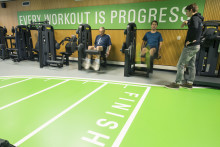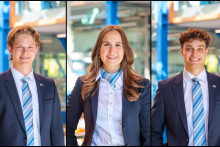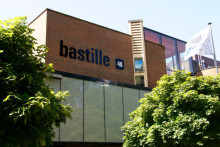From creative courses to fitness and from sandwiches to theatre performances, universities are not allowed to use public money to finance 'private activities' and to offer such facilities 'voluntarily, free of charge or for a small fee'. That would distort the market, the Ministry of Education, Culture and Science wrote to education administrators. So universities should use 'market-based rates'. This so-called policy rule can have enormous consequences for the sports and cultural offerings at the UT, those involved told U-Today when asked.
'Concerns about student well-being'
The Student Union (SU) foresees that this decision will make the threshold for sports and culture on campus too high. SU chair Annick Bijlsma also fears a major impact on the health of students. 'We are mainly concerned about the well-being of students. Sport and culture offer access for exercise and meeting new people. That accessibility to get in touch with sports and culture is what makes the campus so beautiful.' Bijlsma expects that the current relatively low rate of the UnionCard – 75 euros – cannot be maintained. 'If sports become more expensive, the campus will also change', she says.
Sports & Culture manager Gijs Verburg is also concerned about the policy development. 'As a campus university with sports and cultural facilities, we have a unique educational climate and campus life here. Thanks to all these active associations within sports and culture, in which students and staff can participate, we stimulate personal development and the overall well-being of our community. That must be preserved for the future.'
'Different world'
The UT Personnel Consultative Body (OPUT) has been 'taken by surprise' by the news, says brand new chairman Robin van Emmerloot. 'Although it does fit in with the pattern of this cabinet to make rigorous cuts in higher education. That doesn't surprise me.' The OPUT ensures that UT employees can exercise for free by using employment conditions funds for this purpose in consultation with the human resources department. 'This is intended to stimulate the vitality of employees and to create good working conditions. That is a completely different world than disrupting the market, as is suggested with this policy.'
Scenario thinking
For the time being, the much-needed clarity about the exact elaboration and implementation of the policy is lacking, those involved say. 'It is not yet clear what consequences we can expect for sports and culture on campus. Too much is still unclear for that,' says Verburg.
Despite the lack of clarity, the UT does not seem to want to accept the proposed policy. The Executive Board endorses the resistance response of university association UNL, according to spokesperson Laurens van der Velde. Verburg adds: 'We are not alone in this. Together with all universities, we oppose this policy. We are in contact with each other and follow developments closely.'
However, the Student Union is already bracing for impact. 'It is up to us to steer it in the right direction and minimize the impact. Scenario thinking has begun: how do we approach it and how do we implement this plan on campus? What is feasible for associations and finally, what is a market-based rate? These are questions that we as Student Union do not yet have an answer to. Much is still uncertain and unclear, because all options are still open. But it is certain that sports at the UT will become more expensive.'






